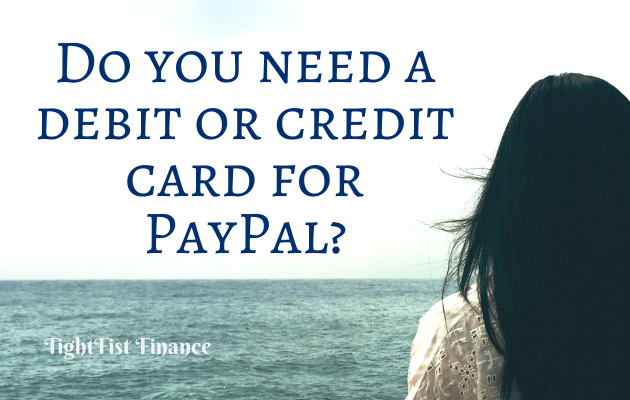Do you need a debit or credit card for PayPal?
You do not need a debit or credit card to use PayPal. Instead, you can fund your account from a bank account, through a check, personal transfer from another PayPal account, or via cash using the PayPal Cash Card.
As one of the most widely used online payment systems, most people have used PayPal for a purchase or two. If you’re thinking about creating a PayPal account, you may be wondering how to fund it.
Luckily for you, I’ll show you the different ways to fund your PayPal account. I’ll help show you the best way to fund your PayPal account that works for you.

This article may contain affiliate links which pay a commission and support this blog. Thank you for your support!
Alternatives to Debit and Credit Cards for PayPal
So, do you need a debit or credit card for PayPal? Simply put, no. While these cards are convenient, they are not the only way to fund your PayPal account.
Instead, opt for connecting your bank account, paying with a check, receiving a personal transfer, or using cash to fund your account.
Bank Accounts for PayPal
Linking your checking account to PayPal is quick and easy. However, you will need a bank card. You will not be paying with your card, but you will need it to confirm that the bank account is yours. Your bank information will never be shared with a third party, and PayPal will act as the secure middleman to move your money where you want it to you.
To link your account to PayPal:
- Go to your PayPal wallet and select “Link a Bank” under “Bank Accounts.”
- Choose whether you want to verify your bank or complete a wire transfer.
Generally speaking, verifying your account is faster and typically free, while wire transfers can take a few days and may have associated fees charged by your bank.
To verify your bank account, you’ll need to supply your bank account details, such as the country it’s in, the account number, and the routing number. You can usually find these details under the “Info” or “Settings” section of your online banking page.
The last step would be to supply your bank card details to verify your linked account.
Depositing a Check on PayPal
If you want to avoid using a card altogether, you can deposit a check straight into your PayPal account. First, you’ll need a PayPal Cash account.
Once you have an account, you can endorse your check. Open the PayPal app on your phone, click on your balance, and click “Cash a Check” on the menu. Follow the prompts to upload or take a picture of your check and accept the terms. Your check should be deposited in 10 days or you can deposit it that same day for a small fee.
Receiving a Transfer on PayPal
If you have a close friend or family member who you trust, you can give them cash and ask them to send the money from their PayPal account to yours. The money will be automatically deposited into your account and ready to use. You both must have personal accounts for these transactions to be free.
Paying Cash on PayPal
If you prefer to pay in cash when funding your PayPal account, you need to request a PayPal Cash Card online. This unique prepaid debit card is funded through cash at local retailers.
After receiving your card, you will choose a nearby location for your payment, such as a 7-Eleven, Walgreens, CVS, or Dollar General. Follow the prompts on the app, take your card to the retailer, and pay in cash. The money will transfer onto your card, and you can then use this on your PayPal account.
Final Thoughts
Debit and credit cards are convenient, but you don’t need them to use PayPal. You can fund PayPal through your bank account, with a personal transfer from another PayPal account, through a check, or by using cash with the PayPal Cash Card. No matter which you choose, you’ll be able to conveniently and securely pay with PayPal online.
Recommended
Based on this article, we think you’ll enjoy the following:
- How to find debit card account number
- Is debit card number same as account number?
- How to close a debit card account
- How to open debit card account
- What is a checkless debit card account?
- How to transfer money from debit card to bank account
- Which is safer? Debit card or checking account
- How to check my current debit card balance
- Can I still use my debit card if my account is closed?
- Can I get atm card for joint account?
- How to order online with debit card
- Can I get a debit card for my savings account?
- What are the types debit card?
- What is a virtual debit card?
- How to get a debit card without a bank account
- Do you need a debit or credit card for PayPal?
- How to find account number from debit card
- How does a debit card account work?